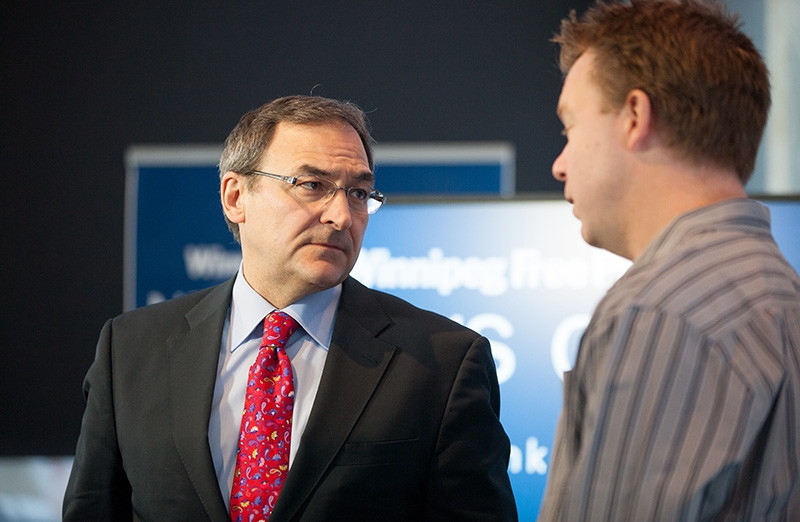Three things you missed at the second Liberal leadership debate
Winnipeg plays host to federal Liberal leadership contenders
This past weekend, the newly renovated Metropolitan Theatre at 281 Donald St. played host to the second debate between nine candidates vying for the leadership of the Liberal Party of Canada, bringing with it a fair share of controversy.
The second debate featured a format that has since been widely panned by multiple political commentators, whereby former Calgary Centre byelection candidate Harvey Locke interviewed each of the nine candidates for the span of roughly 11 minutes on topics ranging from foreign investment, crime, free trade and federal funding for municipalities.
The following are the three things you may have missed from Saturday’s debate, and why they are important.
1. Idle No More protester attempts to break up event
Midway through a rather asinine question and answer session with unlikely leadership contender Karen McCrimmon that opened the debate, an Aboriginal man stormed into the Met beating a hand drum and screaming “Idle No More!”
The protester chided the audience for sitting idly as Aboriginal people “starve,” demanded to speak with Justin Trudeau and invoked the 1969 White Paper on Indian policy as a sign of Liberal racism.
Each candidate subsequently paid lip service to the protester and the Idle No More movement generally, with candidate Joyce Murray in particular acknowledging the fact that the Met stands on Treaty One land. However, the protester was promptly removed from the premises and his presence reveals some of the deep fissures between the Liberal party and the Aboriginal population as represented within the Idle No More movement.
2. The Liberals’ rightward turn
As a clear example of how Stephen Harper’s Conservative Party of Canada continues to frame the national debate, the primary concern of most candidates was how the Liberals can stake out unique public policy terrain on economic issues the Tories have already claimed as their own.
Martha Hall Findlay forcefully defended her proposal to end supply management of dairy and poultry, whereby farmers are awarded production quotas by marketing boards. Through the supply management system, which was once meant to stabilize an unstable industry, imports of similar products are also severely limited by high tariffs, driving up the price of these products domestically for average Canadian consumers.
Hall Findlay, who supports the Trans-Pacific Partnership free trade deal currently in the works by the Harper Conservatives, argues the federal government should willingly give up supply management as a concession in the trade agreement.
Similarly, in the aftermath of the China National Offshore Oil Corporation’s (CNOOC) successful takeover of Calgary oil company Nexen, a discussion of foreign ownership - particularly as it pertains to the oil sands - was the focus of several question and answer sessions with Locke.
The primary consensus reached among the candidates was the need for further clarity on what constitutes net benefit, a key determinant in approving a bid for the foreign takeover of a Canadian company.
3. Justice issues still main focal point of Liberal opposition
The Conservatives’ “tough on crime” approach was the subject of significant disdain by several of the leadership candidates, all of whom decried mandatory minimum sentences in particular as a legislative mechanism that strips judges of their professional discretion and fills Canadian prisons with costly new inmates.
Justin Trudeau and Martha Hall Findlay argued that preventative measures, from investments in community policing to social programs aimed at reducing gang violence, must take precedent over punitive sentencing.
Hall Findlay, addressing the Conservative notion of victim’s rights said “the most important victims right is to never become a victim.” She also chided her party for voting in favour of several Conservative crime measures out of fear of appearing soft on criminals.
For his part, former justice minister and leadership candidate Martin Cauchon invoked CyberTip - a program he helped spearhead - as a successful federal initiative that has measurably reduced the online sexual exploitation of children. Such a community approach, he argued, can be replicated to address other facets of crime in our digital world.
Published in Volume 67, Number 19 of The Uniter (February 7, 2013)








